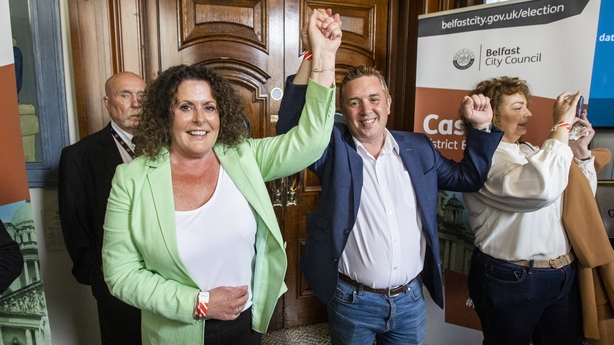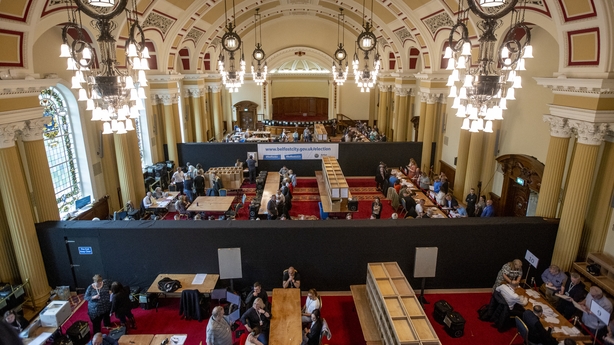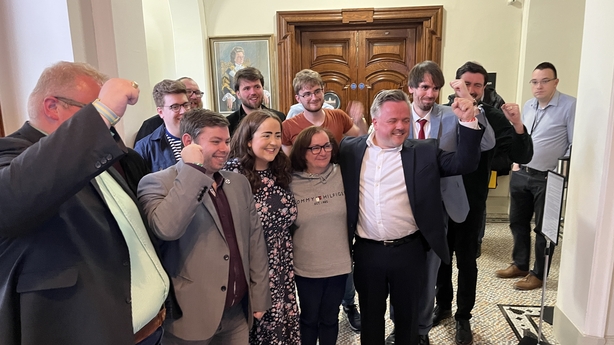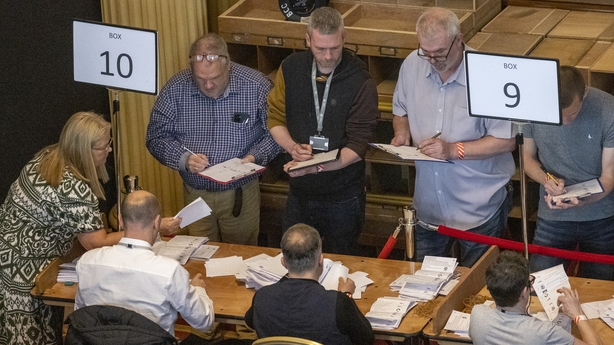Sinn Féin's leader Mary Lou McDonald has said the local election results in Northern Ireland showed "a very strong showing for Sinn Féin right across the north".
Speaking at Belfast City Hall, Ms McDonald said the big issue of the council elections had been the need for the return of the Stormont powersharing institutions.
Her comes come as Sinn Féin appears to have made a strong start as the first results emerge.
Shortly after 6pm, Sinn Féin led the way with 47 councillors elected. The DUP was next on 35, the cross-community Alliance Party had 15, the Ulster Unionists 11, the SDLP six, with six others.
In terms of the share of the first preference votes, Sinn Féin had 30.6%, more than 7% higher than the first preference share it enjoyed in the last council elections in 2019.
It means the republican party appears to be on course to repeat its success from last year's Assembly elections when it emerged as the largest party for the first time.
The DUP secured 23.7% of first preference votes, with Alliance on 12.8%, the UUP on 12% and the SDLP on 8.5%.
The votes are being counted through the single transferable vote system and the process will continue well into tomorrow.
Ms McDonald said: "We ran a very positive campaign and we are very pleased that the response to that has just been so positive by way of returns.
"In the course of the election a lot of things were discussed, all the local issues, but in truth the big issue was that of a return of the executive, the need to have government, the need to have leadership, the need to work together, to make politics work for everybody.

DUP leader Jeffrey Donaldson said that if Sinn Féin emerges as the largest in local government, unionism will have to "look at where it's going".
He said: "Well, let's see when the final votes are all counted who is the largest party, but if Sinn Féin do emerge as the largest party in the council elections I think yet again, as I've been saying, consistently, there are lessons that unionism needs to learn here.
"We can't go on with a situation where turnout in unionist areas is significantly lower than in nationalist areas, you can't go on with a situation where the unionist vote is continually splitting and splintering.
Mr Donaldson added: "The result of that is that seats are gifted to Sinn Féin and to others when the unionist vote is split, and when that unionist vote doesn't transfer sufficiently.
"So I think we really do need to learn the lessons behind all of this, the DUP without a shadow of a doubt is by far the largest unionist party and I think that unionism needs to look at where it's going and regroup around a strong voice for unionism, and see more co-operation between unionist parties."
SF capturing public mood - O'Neill
Speaking on RTÉ's Drivetime, Sinn Féin vice president Michelle O'Neill said her party was capturing the public mood.
"We fought a very positive campaign and no doubt the public have embraced and endorsed that approach," she said.
"We are making historic breakthroughs and gaining seats across every county and in new ground and territory, it is a good sign."
The elections use the single transferable vote system where voters rank candidates in order of preference.
This means how voters transfer their vote can lead to tight races for the final seats in each of the 11 council areas.
The general pattern around voter turn out appeared to be up slightly in areas which would be regarded as predominantly nationalist/republican and down slightly in areas viewed as unionist majority.
Opinion polls ahead of the election suggested that Sinn Féin would emerge as the largest party in local government in Northern Ireland, as they became the largest party at Stormont following last year's Assembly election.
Ms O'Neill said results so far are a "clear signal" from the people that "it is time to get the Assembly up and running".
"People are determined to see the positive transformation of our politics," she said.
"Sinn Féin went into this campaign with a commitment to work for all, and our councillors across the North will take forward that commitment.
"I want to again thank every one who placed your trust in Sinn Féin to deliver a better future for all."

Counting began at centres across Northern Ireland at 8am this morning after voters cast their ballots yesterday.
Sinn Féin's Gary McCleave was the first to be elected at Lisburn and Castlereagh Council, securing a seat in the Killultagh district electoral area (DEA).
His election was swiftly followed by the DUP's Thomas Beckett and Claire Kemp of the Alliance Party in the same DEA.
In Belfast, sitting Lord Mayor Tina Black was among the first elected.
Her Sinn Féin colleague Geraldine McAteer was the first councillor to be elected to the capital's council in the Balmoral district electoral area (DEA).
A short time later, Ms Black, along with DUP candidates Frank McCoubrey and Nicola Verner, were elected in the Court DEA.
Visiting the Lisburn and Castlereagh count centre this morning, DUP leader Jeffrey Donaldson appeared upbeat at the early stage of counting.
He indicated his party was polling well in the area, and would hold its seats in four district electoral areas (DEA) that are being counted so far, and hoped to potentially gain a seat in two DEAs.
"The Alliance Party is polling well in some of areas too, Sinn Féin have done well where you might expect them, so I think the pattern so far in Lisburn and Castlereagh is DUP holding its ground, Alliance perhaps making some gains, perhaps at the expense of the Ulster Unionist Party, and Sinn Féin perhaps making one or two gains at the expense of the SDLP," he told the Belfast Telegraph.
"Our vote has gone up in some areas in Lisburn and Castlereagh but it's too early to tell if we will make a gain.
"I think we were targeting a gain in a couple of areas but we haven't seen the results yet for those two areas."

Alliance Party leader Naomi Long said she was pleased that her party had polled strongly in areas where it had increased its vote share in previous elections.
However she conceded it had not done as well in the west of Northern Ireland as had been hoped.
She put that down to the surge in support for Sinn Féin, which had adversely affected Alliance candidates.
Green Party leader loses seat in Belfast
Northern Ireland's Green Party leader Mal O'Hara also lost his council seat in Belfast, pipped at the last by the SDLP.
In a bad day for the party both Mr O'Hara and his deputy failed to get elected.

Counting is under way at all 11 count centres.
Some 462 council seats are being contested at this year's election.
Northern Ireland's councils are responsible for setting rates, planning and waste collection as well as leisure services and parks.
It is the first electoral test for the parties since last year's Assembly elections and takes place against the backdrop of the Stormont stalemate, with the powersharing institutions not operating as part of a DUP protest against post-Brexit trading arrangements.
Sinn Féin leader Michelle O'Neill said the election was an opportunity for voters to re-affirm last year's assembly election, while DUP leader Jeffrey Donaldson asked unionist voters to unite behind the party to "get back to winning ways".
The Stormont assembly has not been operational for more than a year due to the DUP's boycott of the powersharing institutions in protest against post-Brexit trading arrangements.
Sinn Féin currently has 105 councillors and put forward 162 candidates in this election.
The DUP is currently the largest party in local government with 122 councillors, and ran 152 candidates.
Mr Donaldson has pledged that his party will stand firm over any return to Stormont until political and trading concerns around the Windsor Framework are addressed.
The Alliance party, who became the third biggest party at the last Assembly election, was hoping to build on the 53 councillors they secured at the last local election in 2019.
The cross-community party fielded 110 candidates in 78 out of the 80 district electoral areas.
The Ulster Unionist Party ran 101 candidates, and will be hoping to secure numbers after losses in previous Assembly and local government elections.
The UUP had 75 councillors heading into the election.
The SDLP, which had seen losses in previous elections, was also hoping to hold onto the 59 councillors it had going into the election.
Council elections present an opportunity for smaller parties who have little or no representation in the Assembly to secure a voice in local government.
The TUV ran 46 candidates, the Green Party 37, Aontú 19 and People Before Profit fielded 16.
Belfast City Council is the largest local government area in Northern Ireland with 60 councillors to be elected.

